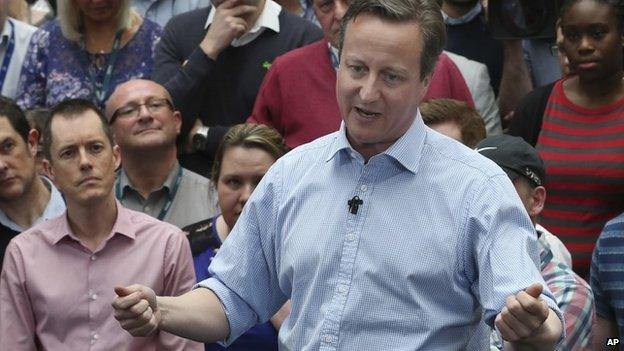Why aren't UK pay rises delivering votes to Cameron?
- Published
- comments

David Cameron may look at today's stats on unemployment and wonder why on earth his party is only neck and neck with Labour in the opinion polls, and not benefiting from record employment levels and a significant rise in inflation-adjusted pay (before tax and benefits).
Probably the most interesting stat for me was that regular pay - excluding bonuses - saw a 2.2% increase in February and a 1.8% rise in the three months to Feb. And for the first time since serious records began, that headline rise is the real rise - because CPI inflation is 0%.
It is striking that fears of employers significantly shrinking pay rises with the disappearance of inflation have not materialised: there is no sign in the UK of so-called bad deflation (which of course means the Bank of England remains on course to push up interest rates, rather than cut them).
Here is the thing: regular pay has been growing at a faster rate than inflation since last October, after years of lagging inflation. And what is more, pay rises in the private sector, which provides more than four-fifths of all employment, are even greater, at 2.6% in one month and 2.2% over three months.
Also, the employment rate of 73.4% is the highest since comparable records began in 1971. And the unemployment rate of 5.6% is down from 8% in early 2010 and is only a fraction higher than it was before the great crash and recession: it was 5.2% in February 2008.
This combination of jobs growth and pay rises is just what David Cameron and George Osborne hoped and prayed would happen when they set the UK on a path of austerity, both massively shrinking public sector employment - from more than 21% of all UK jobs in 2010 to 17.4% today - and freezing public-sector pay.
They assumed they would receive an electoral reward for being tough on the deficit - the record 10% gap between public spending and tax revenues - so long as real pay rose a good few months before polling day and unemployment fell.
So if the economy is delivering the fruits promised by Cameron and Osborne, why no dividend for them?
The conventional explanations, that all the new jobs are going to foreigners or are insecure part time jobs, are not backed up by the stats.
So for example of the 567,000 created over the past year, 281,000 were full time jobs for men and 167,000 were full time jobs for women. Part-time jobs were only a fifth of all new jobs.
Also 61% of the new jobs went to UK nationals.
What's more, the evidence suggests pay rises are translating - on average - into the first rises in real living standards for years, after taking account of inflation, benefits and taxes.
That said, maybe the average is misleading.
It is probable that the rises in average pay - both the headline rate and the real rate of disposable income - are disguising an uneven distribution of rises, such that those who have been in employment for longer and on higher pay are getting the lion's share of the improvement in living standards.
But even if that is the case, it still does not quite explain why voters are not giving more of a hearing to the Conservatives (and are almost completely deaf to the Liberal Democrats).